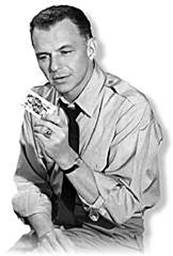1. Advise and Consent (1962) with Henry Fonda, Charles Laughton, Don Murray, Walter Pidgeon, Peter Lawford, Gene Tierney, Franchot Tone, Lew Ayres, Burgess Meredith, Eddie Hodges, Paul Ford, and George Grizzard: Inspired casting by director Otto Preminger has a lot to do with the success of this film about the workings of the U.S. government.
The President, played with authority by Franchot Tone, is ill (secretly dying) and appoints a controversial figure to be Secretary of State, who will continue the implementation of the President’s policies. The nominee is Robert Leffingwell, played by Henry Fonda, who has opposition within the President’s own party.
Walter Pidgeon plays the Senate Majority Leader who has the responsibility of getting the Senate to advise and consent to the President’s appointment. He appoints a young senator (Don Murray) to chair the committee which will hold confirmation hearings. Charles Laughton plays the Southern senator who leads the opposition to his own party’s nominee. He brings in a witness (Burgess Meredith) who accuses Leffingwell of being a communist.
Note: Lew Ayres, who was a popular actor in the 1930’s as Dr. Kildare, plays Vice President Harley Hudson. This is interesting because he ruined his career by being a conscientious objector during WWII. Will Geer, who later played the grandfather on TV’s The Waltons, plays the Senate Minority Leader. This is interesting because he had been blacklisted during the McCarthy Era. Two actors whose personal patriotism had been challenged in the 40’s and 50’s were allowed to play national leaders in 1962.
Note: This was filmed one year before the assassination of JFK. You will see the vice president traveling on a commercial
airliner without secret service protection.
Note: This was filmed years before the Republicans won the Senate in 1980 and before the Gingrich gang of thugs took over the House in 1994. You will see the Senate minority and majority leaders socializing and playing cards together – this used to be the norm.
The only problem with this movie is this: How could anyone not want Henry Fonda to be Secretary of State?
2. The Best Man (1964) with Henry Fonda, Cliff Robertson, Edie Adams, Margaret Leighton, Kevin McCarthy, Gene Raymond, Lee Tracy, Shelley Berman, John Henry Faulk, and Ann Southern: A superb cast and a brilliant screenplay by Gore Vidal bring life and meaning to this film about the maneuverings required to get the presidential nomination at a political convention.
We have a convention unlike any we have seen in recent years. There are five potential candidates and not one them has enough votes to win on the first ballot. Each is staking his hopes on getting the endorsement of the party’s previous winner, former President Art Hockstader (a Harry Truman-type played by Lee Tracy).
The two front runners could not be further apart. Henry Fonda plays William Russell, a liberal-intellectual-statesman not unlike Adlai Stevenson. Cliff Robertson plays Joe Cantwell, a conservative-opportunist-hypocrite-mudslinger clearly patterned after Joe McCarthy and Richard Nixon.
Interestingly, John Henry Faulk appears as one of the other contenders, Gov. T.T. Claypoole. Faulk had been a radio superstar until he was blacklisted during the McCarthy Era. Faulk had been falsely accused of communist sympathies, and here he is playing a presidential candidate only a few years after the blacklist was broken in 1960.
Comedian Shelley Berman gives a rare dramatic performance as Sheldon Bascomb, who shows up at Russell Headquarters with information about Cantwell’s past that would destroy Cantwell’s career: information that was probably true but was irrelevant.
Russell’s dilemma is reminiscent of John Kennedy’s realization of his awesome position of responsibility in 1960: JFK was the only man standing between Richard Nixon and the White House! Russell tells Cantwell, “I can’t let you be President.” But how will he prevent his nomination? Will he use the methods of the man he is trying to stop by using a personal smear, or will he take the high road and find another option?
The only problem with this movie is this: How could anyone not want Henry Fonda to be President?
3. The Manchurian Candidate (1962) with Frank Sinatra, Laurence Harvey, Janet Leigh, Angela Lansbury, James Gregory, John McGiver, James Edwards, and Henry Silva: This film, by director
John Frankenheimer, is about a communist plot to assassinate a presidential candidate at a party convention and use the tragedy to get a demagogue nominated and elected president. If the plan succeeds, he would be given extraordinary powers because the American public and Congress would be terrified of a communist conspiracy, .
In an incident during the Korean War in 1952, an American squad is led into an ambush. They are taken as prisoners into Manchuria and brainwashed by specialists from Russia’s Pavlov Institute. When they are released, every surviving member of the squad believes that Sgt. Raymond Shaw saved them, and he is awarded the Congressional Medal of Honor.
However, Raymond Shaw (Laurence Harvey) has been programmed by the Soviets to be the assassin at a presidential nominating convention. His step-father is Senator Johnny Iselin (James Gregory), who has made a name for himself as an anti-communist, stirring up fear by claiming there were 57 or more communists in the US Defense Department. He’s clearly based on Sen. Joe McCarthy; however, Sen. Iselin is an undercover communist agent groomed to become the American “dictator.” And he gets the vice presidential nomination in 1960!
Senator Gordon (John McGiver) says prophetically, “There are people who think of Johnny as a clown and buffoon, but I do not. I despise John Iselin and everything that Iselinism has come to stand for. I think if John Iselin were a paid Soviet agent, he could not do more to harm this country than he is doing now.”
Major Bennett Marco (Frank Sinatra), the commander of the brainwashed squad, has recurring nightmares of his captivity and cannot accept that Raymond Shaw is “the kindest, bravest, warmest, most wonderful human being I’ve ever known in my life.” It is he who begins to uncover the fiendish plot.
Angela Lansbury plays Shaw’s mother and Johnny Iselin’s wife, and it is she who is the key American operative behind the communist scheme. She explains to her son what will happen after he assassinates the presidential nominee. Johnny will dramatically pick up the slain victim and address the convention. “The speech is short, but it is the most rousing speech I’ve ever read. It has been worked on here and in Russia on and off for over eight years. I shall force someone to take the body from him; and Johnny will lead those microphones and cameras, with blood all over him, defending America even if it means his own death, rallying a nation of television viewers with hysteria to sweep us into the White House with powers that will make martial law seem like anarchy.”
The unforgettable trigger mechanism to activate Shaw is “Why don’t you pass the time by playing a little Solitaire?” Look out when the Queen of Diamonds shows up!
4. Seven Days in May (1964) with Burt Lancaster, Kirk Douglas, Frederic March, Edmond O’Brien, Martin Balsam, Hugh Marlowe, John Larkin, Whit Bissell, Andrew Duggan, John
Houseman, and Ava Gardner: This is another masterpiece by director John Frankenheimer. This one is about a military plot, led by the Chairman of the Joint Chiefs of Staff, to overthrow the government of the United States.
Gen. James Mattoon Scott (Burt Lancaster) disapproves of the nuclear disarmament agreement with Russia that has been arranged by President Jordan Lyman (Frederic March). Scott has joint chiefs behind him, as well as a key senator (Whit Bissell), a goose-stepping colonel (John Larkin), and a right-wing commentator (Hugh Marlowe). There are even protest marchers picketing the White House. The protesters call the President’s supporters “Lyman Lovers.”
The chairman’s chief aide, Col. “Jiggs” Casey (Kirk Douglas), is left out of the loop. He begins to get suspicious about a mysterious secret military base called ECOMCON; a weird Preakness horse racing bet among the military brass; and a special military exercise on Sunday in which the President will be isolated from the public, the press, and congressional representatives. He takes his fears to the President, and the President’s most trusted allies begin a desperate investigation. This all takes place within seven days in May.
Lyman eventually decides to ask for General Scott's resignation to avoid a scandal that could traumatize the nation. A top advisor agrees, “It is time we face the enemy.” President Lyman corrects him: “He is not the enemy. Scott, the Joint Chiefs, even the very emotional, illogical lunatic fringe – they’re not the enemy. The enemy is an age, a nuclear age. It has killed man’s faith in his ability to influence what happens to him. And out of this comes a sickness, a sickness of frustration, a feeling of impotence, helplessness, weakness. And from this, this desperation, we look for a champion in red, white, and blue. Every now and then a man rides by on a white horse and we appoint him to be our god for the duration. For some men, it was a Senator McCarthy. For others, it was a General Walker. And now it is a General Scott.”
Send me an email: dboffutt@suddenlink.net


